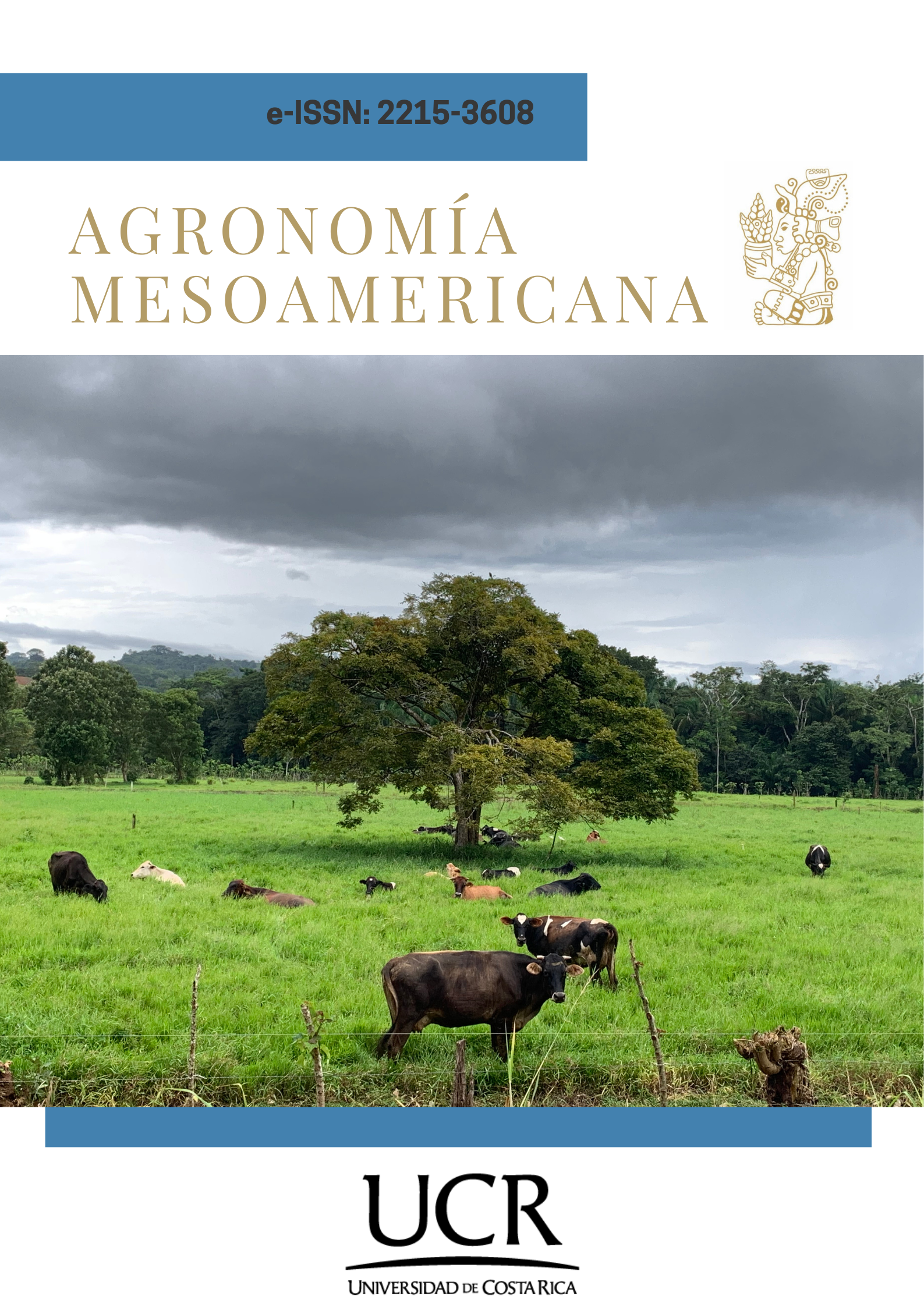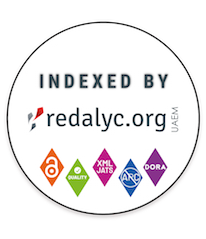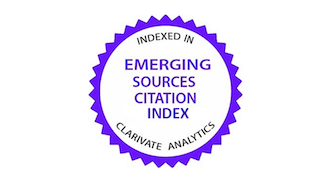Characterization and climate adaptation capacity of livestock farmers in two regions of Costa Rica
DOI:
https://doi.org/10.15517/am.2025.58866Keywords:
dairy farms, global warming, typologies, cattle ranchersAbstract
Introduction. Dairy farms in Costa Rica have been classified into three production systems: specialized high-altitude, specialized lowland, and dual-purpose systems. However, this typification does not reflect their current complexity level, as there exists a wide variety of production systems based on sanitary, reproductive and feeding management practices. Objective. To characterize the dairy production systems in two representative livestock regions of Costa Rica and their technological adaptation capacities to climate change. Materials and methods. To determine the technical-productive, social, and economic characteristics of Costa Rican dairy farms located in the Chorotega and Huetar Norte regions, a designed and validated survey was applied. Data were collected between April and May 2021. A total of 143 farmers were interviewed, allowing for the evaluation of 193 variables. Subsequently, cluster analysis was performed, executing hierarchical cluster analysis, using Ward’s method. Results. Three clusters were obtained with farm management capacities: high, medium, and low, related to their climate change adaptation capacities. The first group comprised producers with higher education and farm management levels (high capacity), reflected in the adoption of more adaptation strategies. The farms of the second group (medium capacity), with lower technical management than the first group, and the third group of farms (low capacity), composed of producers with the lowest educational level, demonstrated a more limited technological management capacity. Conclusions. The livestock activity was characterized by three groups of producers with different climate change adaptation capacities.
Downloads
References
Ahikiriza, E., Wesana, J., Gellynck, X., Van Huylenbroeck, G., & Lauwers, L. (2021). Context specificity and time dependency in classifying sub-saharan africa dairy cattle farmers for targeted extension farm advice: the case of Uganda. Agriculture, 11(9), Article 836. https://doi.org/10.3390/agriculture11090836
Amamou, H., Sassi, M. B., Aouadi, H., Khemiri, H., Mahouachi, M., Beckers, Y., & Hammami, H. (2018). Climate change-related risks and adaptation strategies as perceived in dairy cattle farming systems in Tunisia. Climate Risk Management, 20, 38–49. https://doi.org/10.1016/j.crm.2018.03.004
Andrighetto Canozzi, M. E., Rocha Marques, P., De Souza Teixeira, O., McManus Pimentel, C. M., Dhein Dill, M., & Jardim Barcellos, J. O. (2019). Typology of beef production systems according to bioeconomic efficiency in the south of Brazil. Ciência Rural, 49(10), Article e20190030. https://doi.org/10.1590/0103-8478cr20190030
Arrieta-González, A., Hernández-Beltrán, A., Barrientos-Morales, M., Martínez-Herrera, D. I., Cervantes-Acosta, P., Rodríguez-Andrade, A., & Dominguez-Mancera, B. (2022). Caracterización y tipificación tecnológica del sistema de bovinos doble propósito de la Huasteca Veracruzana México. Revista MVZ Córdoba, 27(2), Articulo e2444. https://doi.org/10.21897/rmvz.2444
Avilez, J. P., Escobar, P., Von Fabeck, G., Villagran, K., García, F., Matamoros, R., & García Martínez, A. (2010). Caracterización productiva de explotaciones lecheras empleando metodología de análisis multivariado. Revista Científica, 20(1), 74–80.
Avilez, J. P., Meyer, J., Nahed, J., Ruiz, F. A., Mena Guerrero, Y., & Castel Genis, J. M. (2018). Classification, characterisation and strategies for improvement of cattle and sheep pasture systems in marginal areas of Southern Chile. Revista Mexicana de Ciencias Pecuarias, 9(2), 240–262. https://doi.org/10.22319/rmcp.v9i2.4491
Ayora Garagate, L. (2015). Determinación de atributos y evaluación de la sustentabilidad de parcelas agrícolas (fincas) en la cuenca media y baja del río Supe, Barranca. Aporte Santiaguino, 8(2), 229–240. https://doi.org/10.32911/as.2015.v8.n2.228
Ballesteros Possú, W., Navia, J. F., & Solarte, J. G. (2021). Socio-economic characterization of the traditional cacao agroforestry system (Theobroma cacao L.). Revista de Ciencias Agrícolas, 38(2), 17–35. https://doi.org/10.22267/rcia.213802.156
Barrientos, O., & Villegas, L. (2010). Sector agropecuario cadena productiva de leche políticas y acciones. Ministerio de Agricultura y Ganadería. http://sepsa.go.cr/docs/2010_Politica_SectorAgro_Leche.pdf
Bâtie, C., Ha, L. T. T., Loire, E., Truong, D. B., Tuan, H. M., Cuc, N. T. K., Paul, M., & Goutard, F. (2022). Characterisation of chicken farms in Vietnam: a typology of antimicrobial use among different production systems. Preventive Veterinary Medicine, 208, Article 105731. https://doi.org/10.1016/j.prevetmed.2022.105731
Benítez Jiménez, D. G., Vargas Burgos, J. C., Torres Cárdenas, V., & Soria Re, S. (2016). La incidencia de las prácticas ganaderas en la productividad de los rebaños de cría en la provincia de Pastaza de la Amazonía ecuatoriana. Avances en Investigación Agropecuaria, 20(3), 43–61. http://ww.ucol.mx/revaia/portal/pdf/2016/sept/4.pdf
Bragaglio, A., Romano, E., Brambilla, M., Bisaglia, C., Lazzari, A., Giovinazzo, S., & Cutini, M. (2023). A comparison between two specialized dairy cattle farms in the upper Po Valley. Precision agriculture as a strategy to improve sustainability. Cleaner Environmental Systems, 11, Article 100146. https://doi.org/10.1016/j.cesys.2023.100146
Cahill, L., Patton, D., Reilly, B., Pierce, K. M., & Horan, B. (2023). Grazing season length and stocking rate affect milk production and supplementary feed requirements of spring-calving dairy cows on marginal soils. Journal of Dairy Science, 106(2), 1051–1064. https://doi.org/10.3168/jds.2021-21244
Danso-Abbeam, G. (2022). Do agricultural extension services promote adoption of soil and water conservation practices? Evidence from Northern Ghana. Journal of Agriculture and Food Research, 10, Article 100381. https://doi.org/10.1016/j.jafr.2022.100381
De León-García, R., Thomas, G., & Castillo, O. (2018). Caracterización y tipificación de pequeñas fincas doble propósito de la provincia de Bocas del Toro-Panamá. Ciencia Agropecuaria, (29), 13–40. http://200.46.165.126/index.php/ciencia-agropecuaria/article/view/51
De Sousa, K., Casanoves, F., Sellare, J., Ospina, A., Suchini, J. G., Aguilar, A., & Mercado, L. (2018). How climate awareness influences farmers’ adaptation decisions in Central America? Journal of Rural Studies, 64, 11–19. https://doi.org/10.1016/j.jrurstud.2018.09.018
Erekalo, K. T., & Yadda, T. A. (2023). Climate-smart agriculture in Ethiopia: adoption of multiple crop production practices as a sustainable adaptation and mitigation strategies. World Development Sustainability, 3, Article 100099. https://doi.org/10.1016/j.wds.2023.100099
Federación de Cámaras de Ganaderos de Guanacaste, & Ministerio de Agricultura y Ganadería. (2007). Plan estratégico para el desarrollo de la agrocadena de la ganadería bovina de carne en la región Chorotega. Federación de Cámaras de Ganaderos de Guanacaste, & Ministerio de Agricultura y Ganadería.
Fenger, F., Casey, I. A., Buckley, C., & Humphreys, J. (2023). Effects of grazing platform stocking rate on productivity and profitability of pasture-based dairying in a fragmented farm scenario. Journal of Dairy Science, 106(11), 7750–7768. https://doi.org/10.3168/jds.2023-23362
Freitas Silveira, R. M., Da Silva, V. J., Ferreira, J., Dos Santos Fontenelle, R. O., Ortiz Vega, W. H., Cavalcanti Sales, D., Pereira Sales, A., Martins Castro, M. S., Toro-Mujica, P., & De Vasconcelos, A. M. (2022). Diversity in smallholder dairy production systems in the Brazilian semiarid region: farm typologies and characteristics of raw milk and water used in milking. Journal of Arid Environments, 203. Article 104774. https://doi.org/10.1016/j.jaridenv.2022.104774
Galina, C. S., Turnbull, F., & Noguez-Ortiz, A. (2016). Factors affecting technology adoption in small community farmers in relation to reproductive events in tropical cattle raised under dual purpose systems. Open Journal of Veterinary Medicine, 6(1), 15–21. https://doi.org/10.4236/ojvm.2016.61003
Ghahramani, A., Kingwell, R. S., & Maraseni, T. N. (2020). Land use change in Australian mixed crop-livestock systems as a transformative climate change adaptation. Agricultural Systems, 180, Article 102791. https://doi.org/10.1016/j.agsy.2020.102791
Girma, Y., & Kuma, B. (2022). A meta analysis on the effect of agricultural extension on farmers’ market participation in Ethiopia. Journal of Agriculture and Food Research, 7, Article 100253. https://doi.org/10.1016/j.jafr.2021.100253
Guo, H., Xia, Y., Jin, J., & Pan, C. (2022). The impact of climate change on the efficiency of agricultural production in the world’s main agricultural regions. Environmental Impact Assessment Review, 97, Article 106891. https://doi.org/10.1016/J.EIAR.2022.106891
Havlik, P., Valin, H., Herrero, M., Obersteiner, M., Schmid, E., Rufino, M. C., Mosnier, A., Thornton, P. K., Böttcher, H., Conant, R. T., Frank, S., Fritz, S., Fuss, S., Kraxner, F., & Notenbaert, A. (2014). Climate change mitigation through livestock system transitions. Proceedings of the National Academy of Sciences, 111(10), 3709–3714. https://doi.org/10.1073/pnas.1308044111
Instituto Meteorológico Nacional. (s. f.). Regiones y subregiones climáticas de Costa Rica. https://www.imn.ac.cr/documents/10179/20909/Regionalizaci%C3%B3n+clim%C3%A1tica+de+Costa+Rica
Instituto Nacional de Estadística y Censos. (2015). VI Censo Nacional Agropecuario. Actividades pecuarias, prácticas y servicios agropecuarios. https://admin.inec.cr/sites/default/files/media/reagropeccenagro2014-tiii-008_6.pdf
Kassa, B. A., & Abdi, A. T. (2022). Factors influencing the adoption of climate-smart agricultural practice by small-scale farming households in Wondo Genet, Southern Ethiopia. SAGE Open, 12(3), 1–13. https://doi.org/10.1177/21582440221121604
Lalani, B., Aminpour, P., Gray, S., Williams, M., Büchi, L., Haggar, J., Grabowski, P., & Dambiro, J. (2021). Mapping farmer perceptions, conservation agriculture practices and on-farm measurements: the role of systems thinking in the process of adoption. Agricultural Systems, 191, Article 103171. https://doi.org/10.1016/j.agsy.2021.103171
Luik-Lindsaar, H., Põldaru, R., & Roots, J. (2019). Estonian dairy farms’ technical efficiency and factors predicting it. Agronomy Research, 17(2), 593–607. https://doi.org/10.15159/AR.19.067
Martínez García, C. G., Dorward, P., & Rehman, T. (2012). Farm and socio-economic characteristics of smallholder milk producers and their influence on technology adoption in Central Mexico. Tropical Animal Health and Production, 44(6), 1199–1211. https://doi.org/10.1007/s11250-011-0058-0
McCarthy, B., Delaby, L., Pierce, K. M., McCarthy, J., Fleming, C., Brennan, A., & Horan, B. (2016). The multi-year cumulative effects of alternative stocking rate and grazing management practices on pasture productivity and utilization efficiency. Journal of Dairy Science, 99(5), 3784–3797. https://doi.org/10.3168/jds.2015-9763
McCarthy, J., McCarthy, B., Horan, B., Pierce, K. M., Galvin, N., Brennan, A., & Delaby, L. (2014). Effect of stocking rate and calving date on dry matter intake, milk production, body weight, and body condition score in spring-calving, grass-fed dairy cows. Journal of Dairy Science, 97(3), 1693–1706. https://doi.org/10.3168/jds.2013-7458
Mejía-Valvas, R. L., Gómez-Pando, L., & Pinedo-Taco, R. (2021). Caracterización de las unidades productivas del cultivo de kiwicha (Amaranthus caudatus) en las provincias de Yungay, Huaylas y Carhuaz, en el departamento de Áncash, Perú. Ciencia y Tecnología Agropecuaria, 22(1), Articulo e1440. https://doi.org/10.21930/RCTA.VOL22_NUM1_ART:1440
Ministerio de Agricultura y Ganadería, & Ministerio de Ambiente y Energía. (2015). Estrategia para la ganadería baja en carbono en Costa Rica. http://www.mag.go.cr/bibliotecavirtual/L01-11006.pdf
Montcho, M., Padonou, E. A., Houngbédji, M., Montcho, M., Mutua, M. N., & Sinsin, B. (2021). Variation of nutritional and microbiological properties of milk in relation to climate adaptation strategies across dairy production systems in West Africa. International Dairy Journal, 122, Article 105144. https://doi.org/10.1016/j.idairyj.2021.105144
Mugambi, D. K., Wambugu, S. K., Gitunu, A. M. M., & Mwangi, M. (2017, April 26). Estimation of milk production efficiency of dairy cow farms in Embu and Meru counties of Kenya [Conference presentation abstract]. JKUAT Annual Scientific Conference, Kenya. http://ir.jkuat.ac.ke/handle/123456789/2997
Mullan, M., Kingsmill, N., Agrawala, S., & Matus Kramer, A. (2015). National adaptation planning: lessons from OECD countries. In W. Leal Filho (Ed.), Handbook of climate change adaptation (pp. 1165–1182). Springer. https://doi.org/10.1007/978-3-642-38670-1_38
Mulwa, C., Marenya, P., Rahut, D. B., & Kassie, M. (2017). Response to climate risks among smallholder farmers in Malawi: a multivariate probit assessment of the role of information, household demographics, and farm characteristics. Climate Risk Management, 16, 208–221. https://doi.org/10.1016/j.crm.2017.01.002
Musafiri, C. M., Macharia, J. M., Ng’etich, O. K., Kiboi, M. N., Okeyo, J., Shisanya, C. A., Okwuosa, E. A., Mugendi, D. N., & Ngetich, F. K. (2020). Farming systems’ typologies analysis to inform agricultural greenhouse gas emissions potential from smallholder rain-fed farms in Kenya. Scientific African, 8, Article e00458. https://doi.org/10.1016/j.sciaf.2020.e00458
Mwanga, G., Mujibi, F. D. N., Yonah, Z. O., & Chagunda, M. G. G. (2019). Multi-country investigation of factors influencing breeding decisions by smallholder dairy farmers in sub-Saharan Africa. Tropical Animal Health and Production, 51(2), 395–409. https://doi.org/10.1007/s11250-018-1703-7
Ogada, M. J., Radeny, M., Recha, J., & Dawit, S. (2021). Adoption of complementary climate-smart agricultural technologies: lessons from Lushoto in Tanzania. Agriculture & Food Security, 10, Article 55. https://doi.org/10.1186/s40066-021-00321-w
Ogasawara, Y., & Kon, M. (2021). Two clustering methods based on the Ward’s method and dendrograms with interval-valued dissimilarities for interval-valued data. International Journal of Approximate Reasoning, 129, 103–121. https://doi.org/10.1016/j.ijar.2020.11.001
Paul, B. K., Groot, J. C. J., Birnholz, C. A., Nzogela, B., Notenbaert, A., Woyessa, K., Sommer, R., Nijbroek, R., & Tittonell, P. (2020). Reducing agro-environmental trade-offs through sustainable livestock intensification across smallholder systems in Northern Tanzania. International Journal of Agricultural Sustainability, 18(1), 35–54. https://doi.org/10.1080/14735903.2019.1695348
Pinedo Taco, R., Gómez Pando, L., & Julca Otiniano, A. (2017). Caracterización de los sistemas de producción de quinua (Chenopodium quinoa Wiilld) en el distrito de Chiara, Ayacucho. Aporte Santiaguino, 10(2), 351–364. https://doi.org/10.32911/as.2017.v10.n2.176
Rangel, J., Perea, J., De-Pablos-Heredero, C., Espinosa-García, J. A., Toro Mujica, P., Feijoo, M., Barba, C., & García, A. (2020). Structural and technological characterization of tropical smallholder farms of dual-purpose cattle in Mexico. Animals, 10(1), Article 86. https://doi.org/10.3390/ani10010086
Roche, J. R., Berry, D. P., Bryant, A. M., Burke, C. R., Butler, S. T., Dillon, P. G., Donaghy, D. J., Horan, B., Macdonald, K. A., & Macmillan, K. L. (2017). A 100-Year Review: A century of change in temperate grazing dairy systems. Journal of Dairy Science, 100(12), 10189–10233. https://doi.org/10.3168/jds.2017-13182
Rodríguez Lizano, V., & Montero Vega, M. (2016). Facing a free trade agreement: Monte Carlo analysis of small dairy farms in Costa Rica. International Journal of Development Research, 6(10), 9644–9648. https://www.journalijdr.com/sites/default/files/issue-pdf/6572.pdf
Rojas-Downing, M. M., Nejadhashemi, A. P., Harrigan, T., & Woznicki, S. A. (2017). Climate change and livestock: impacts, adaptation, and mitigation. Climate Risk Management, 16, 145–163. https://doi.org/10.1016/j.crm.2017.02.001
Rust, J. M. (2019). The impact of climate change on extensive and intensive livestock production systems. Animal Frontiers, 9(1), 20–25. https://doi.org/10.1093/af/vfy028
Secretaría Ejecutiva de Planificación Sectorial Agropecuaria. (2018). Boletín estadístico agropecuario No 28. INFOAGRO.
Serrano Martínez, E., Lavín González, P., Giráldez García, F. J., Bernués Jal, A., & Ruiz Mantecón, A. (2004). Classification variables of cattle farms in the mountains of León, Spain. Spanish Journal of Agricultural Research, 2(4), 504–511. https://doi.org/10.5424/sjar/2004024-106
Solano, C., León, H., Pérez, E., & Herrero, M. (2003). The role of personal information sources on the decision-making process of Costa Rican dairy farmers. Agricultural Systems, 76(1), 3–18. https://doi.org/10.1016/S0308-521X(02)00074-4
Tangorra, F. M., Calcante, A., Vigone, G., Assirelli, A., & Bisaglia, C. (2022). Assessment of technical-productive aspects in Italian dairy farms equipped with automatic milking systems: A multivariate statistical analysis approach. Journal of Dairy Science, 105(9), 7539–7549. https://doi.org/10.3168/jds.2021-20859
Tatis Diaz, R., Pinto Osorio, D., Medina Hernández, E., Moreno Pallares, M., Canales, F. A., Corrales Paternina, A., & Echeverría-González, A. (2022). Socioeconomic determinants that influence the agricultural practices of small farm families in northern Colombia. Journal of the Saudi Society of Agricultural Sciences, 21(7), 440–451. https://doi.org/10.1016/j.jssas.2021.12.001
Temoche Socola, V. A. (2019). Sistema de producción de caprinos en tres zonas vulnerables al cambio climático de la Región Piura [Tesis de maestría, Universidad Nacional Agraria la Molina]. Repositorio de la Universidad Nacional Agraria La Molina. https://repositorio.lamolina.edu.pe/handle/20.500.12996/3985
Toro-Mujica, P., Vera, R., Pinedo, P., Bas, F., Enríquez-Hidalgo, D., & Vargas-Bello-Pérez, E. (2020). Adaptation strategies based on the historical evolution for dairy production systems in temperate areas: A case study approach. Agricultural Systems, 182, Article 102841. https://doi.org/10.1016/j.agsy.2020.102841
Torres, V., Cobo, R., Sanchez, L., & Raez, N. (2013). Statistical tool for measuring the impact of milk production on the local development of a province in Cuba. Livestock Research for Rural Development, 25(9), Article 159. http://www.lrrd.org/lrrd25/9/torr25159.htm
Valerio Cabrera, D., García Martínez, A., Acero de la Cruz, R., Castaldo, A., Perea, J. M., & Martos Peinado, J. (2004). Metodologías para la caracterización y tipificación de sistemas ganaderos. Documentos de Trabajo Producción Animal y Gestión, (1), 1–9.
Vargas-Leitón, B., Solís-Guzmán, O., Sáenz-Segura, F., & León-Hidalgo, H. (2013). Caracterización y clasificación de hatos lecheros en Costa Rica mediante análisis multivariado. Agronomía Mesoamericana, 24(2), 257–275. https://doi.org/10.15517/am.v24i2.12525
Verburg, R. W., Verberne, E., & Negro, S. O. (2022). Accelerating the transition towards sustainable agriculture: the case of organic dairy farming in the Netherlands. Agricultural Systems, 198, Article 103368. https://doi.org/10.1016/j.agsy.2022.103368
Visinescu, L. L., & Evangelopoulos, N. (2014). Orthogonal rotations in latent semantic analysis: an empirical study. Decision Support Systems, 62, 131–143. https://doi.org/10.1016/j.dss.2014.03.010
Zevallos, E. (2013). Agenda de competitividad para la región Huetar Norte: caracterización socioeconómica de la región Huetar Norte. Ministerio de Economía, Industria y Comercio, Agencia Española de Cooperación Internacional para el Desarrollo, & Fundación de la Universidad de Costa Rica. https://www.munisc.go.cr/documentos/NuestraMunicipalidad/Caracterizaci%C3%B3n%20Socioecon%C3%B3mica%20de%20la%20Regi%C3%B3n%20Huetar%20Norte.pdf

Downloads
Additional Files
Published
How to Cite
Issue
Section
License
Copyright (c) 2025 Gerardo Cortés-Muñoz, Eduardo Fuentes-Navarro, Waldemar Mercado-Curi

This work is licensed under a Creative Commons Attribution-NonCommercial-NoDerivatives 4.0 International License.
1. Proposed policy for open access journals
Authors who publish in this journal accept the following conditions:
a. Authors retain the copyright and assign to the journal the right to the first publication, with the work registered under the attribution, non-commercial and no-derivative license from Creative Commons, which allows third parties to use what has been published as long as they mention the authorship of the work and upon first publication in this journal, the work may not be used for commercial purposes and the publications may not be used to remix, transform or create another work.
b. Authors may enter into additional independent contractual arrangements for the non-exclusive distribution of the version of the article published in this journal (e.g., including it in an institutional repository or publishing it in a book) provided that they clearly indicate that the work was first published in this journal.
c. Authors are permitted and encouraged to publish their work on the Internet (e.g. on institutional or personal pages) before and during the review and publication process, as it may lead to productive exchanges and faster and wider dissemination of published work (see The Effect of Open Access).



























